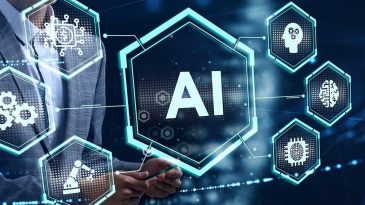- Tech
- Updated on December 4, 2024
How to Use AI in Software Development

The integration of artificial intelligence (AI) in software development has revolutionized how developers approach coding, testing, and project management. By automating repetitive tasks, enhancing decision-making processes, and delivering data-driven insights, AI has become a cornerstone of modern software engineering. This comprehensive guide explores the role of AI in software development, its benefits, and how developers can harness its power for efficient and innovative solutions.
Understanding AI in Software Development

Artificial intelligence refers to the simulation of human intelligence by machines, enabling them to learn, reason, and perform complex tasks. In software development, AI leverages algorithms, machine learning, and deep learning to automate various processes and solve challenges. From generating code snippets to predicting software failures, AI transforms conventional workflows by offering smarter and faster solutions.
AI applications in development extend beyond automation. They assist in understanding user behaviors, optimizing backend processes, and even crafting better user interfaces. Tools like Zencoder.ai take this further by offering AI-powered coding and debugging solutions, significantly reducing development timelines.
Benefits of AI in Software Development
AI in software development offers transformative benefits that enhance efficiency, accuracy, and innovation. By automating repetitive tasks such as debugging, testing, and code generation, AI allows developers to focus on creative problem-solving and complex programming challenges.
AI-powered algorithms improve code quality by detecting errors and suggesting fixes in real time, minimizing the risk of software failures. Additionally, AI enhances decision-making through data-driven insights, helping teams prioritize features and optimize resources.
For agile development processes, AI facilitates better collaboration and task management, ensuring on-time project completion. By reducing costs, improving productivity, and offering predictive analytics, AI empowers developers to build scalable and secure software solutions. Its ability to adapt and learn ensures that AI remains a valuable asset in meeting the ever-evolving demands of the software industry.
AI’s integration into software development offers numerous advantages, including:
- Enhanced Productivity: AI tools automate repetitive tasks like code reviews and bug detection, allowing developers to focus on creative problem-solving.
- Improved Accuracy: Machine learning algorithms identify and correct errors faster than traditional methods, ensuring higher-quality code.
- Faster Time-to-Market: By streamlining workflows, AI accelerates the development cycle, enabling teams to deliver projects on time.
- Cost Efficiency: Automated tools reduce the need for extensive manual labor, cutting down costs for businesses.
- Data-Driven Decisions: AI provides actionable insights from vast data sets, aiding in project decisions and prioritization.
Identifying AI Use Cases in Software Development
AI has revolutionized software development by introducing versatile use cases that enhance productivity and innovation. Code generation tools like Zencoder.ai automate repetitive tasks, allowing developers to focus on creative solutions. AI-powered testing tools streamline quality assurance by identifying bugs and performing regression tests efficiently.
In project management, AI optimizes task allocation and predicts timelines to keep projects on track. Developers leverage AI for predictive maintenance, identifying potential failures in codebases before they occur. Additionally, AI improves user experiences through personalized recommendations and intuitive design adjustments. These use cases demonstrate AI’s potential to streamline workflows and deliver high – quality software.
AI can be applied across various stages of the software development lifecycle:
- Code Generation and Assistance: Tools generate code snippets based on input prompts, reducing manual effort.
- Software Testing: AI-powered tools automate testing procedures, identify edge cases, and perform regression tests.
- Project Management: AI algorithms optimize task allocation, timeline predictions, and resource management.
- Predictive Maintenance: AI analyzes codebases to predict potential failures or bugs, preventing downtime.
- Customer Interaction: Chatbots powered by AI assist in resolving customer queries and gathering feedback for future development.
Steps to Integrate AI into Development Workflows
To successfully integrate AI into software development, follow these steps:

Integrating AI into development workflows requires a structured approach to maximize its benefits. Start by identifying repetitive or time-consuming tasks in your process, such as testing, debugging, or data analysis, where AI tools can bring efficiency. Next, choose the right AI tools or platforms, tailored to your specific needs, whether for code generation, error detection, or workflow automation. Ensure that your team is trained on these tools to facilitate seamless adoption.
Integrate AI tools into your existing software stack, using APIs or plugins for compatibility. Establish clear metrics to measure AI’s impact, such as reduced development time or improved code quality. Continuously monitor performance and fine-tune the AI’s functionality based on real-world results. Finally, foster a collaborative environment, blending human expertise with AI’s capabilities to enhance innovation and maintain workflow efficiency while ensuring high-quality deliverables.
- Assess Current Processes: Identify areas in your development lifecycle where automation or intelligence can bring value.
- Choose the Right Tools: Select AI tools suited to your project’s needs, such as Zencoder.ai for code generation or debugging.
- Train Your Team: Ensure that developers understand how to use AI tools effectively and integrate them into existing workflows.
- Start Small: Begin by applying AI to less critical tasks to test its effectiveness before scaling its usage.
- Monitor and Optimize: Continuously evaluate the AI’s performance and make adjustments to maximize efficiency.
Best AI Tools for Software Developers
Several AI tools have gained prominence for their effectiveness in software development:
- Zencoder.ai: Renowned for its ability to generate optimized code snippets, automate testing, and streamline debugging, making it indispensable for developers.
- GitHub Copilot: A coding assistant that suggests code lines and functions as you type.
- TabNine: A tool that leverages machine learning to autocomplete code in real time.
- CodeT5: An advanced language model for code understanding and generation.
- Postman: Integrates AI for API testing and automation.
By using these tools, developers can save time, reduce errors, and improve project outcomes.
Who Can Use AI in Software Development
AI is not limited to large tech companies or seasoned developers. Its versatility makes it accessible to a range of professionals:
- Startups: Benefit from cost-effective automation tools to scale projects efficiently.
- Freelancers: Use AI to manage multiple projects by automating repetitive tasks.
- Enterprise Developers: Optimize large-scale applications and workflows with AI-powered tools.
- Beginner Developers: Leverage AI for learning and generating code, accelerating their growth in the field.
How AI Improves Debugging Efficiency
AI significantly improves debugging efficiency by automating error detection and providing intelligent solutions. AI models analyze patterns in code to predict and flag potential vulnerabilities, reducing the likelihood of future errors.
By suggesting precise fixes, AI accelerates the debugging process, enabling developers to focus on higher-value tasks. Additionally, AI minimizes false positives, ensuring that developers aren’t wasting time on non-critical issues. Its ability to learn from past debugging data makes it an invaluable tool for maintaining code quality and project timelines.
Debugging is a time-consuming but essential part of software development. AI simplifies this process by:
- Automating Error Detection: AI tools scan thousands of lines of code to identify bugs in seconds.
- Suggesting Fixes: Platforms not only detect errors but also provide solutions, saving time and effort.
- Learning Patterns: Machine learning models identify recurring errors, allowing developers to address systemic issues proactively.
- Minimizing False Positives: AI’s accuracy reduces the instances of incorrect bug flags, making debugging more reliable.
Mitigating the Potential Risks of AI in Software Development
Despite its advantages, AI introduces challenges that need careful management:

- Bias in Algorithms: Ensure that AI tools are trained on diverse datasets to avoid biased outputs.
- Overreliance on Automation: While AI can handle many tasks, human oversight is essential to ensure quality and creativity.
- Security Concerns: AI tools must be assessed for vulnerabilities that could expose sensitive data.
- Job Displacement: Mitigate fears of automation by reskilling teams and integrating AI as a support system rather than a replacement.
By addressing these risks, teams can ensure that AI enhances their work without creating new problems.
Common Challenges of Using AI in Software Projects
Using AI in software projects comes with challenges that require strategic management. A major hurdle is the high initial investment, as AI tools and infrastructure can be costly, especially for small businesses. Developers face a steep learning curve when integrating AI into workflows, requiring time and training. Data privacy concerns arise when handling large datasets, demanding robust security measures. Additionally, integrating AI with existing systems can be complex and time-consuming, risking delays in project timelines.
Overreliance on AI may also hinder creativity, as automated solutions may lack human intuition. Addressing these challenges is key to successfully leveraging AI in development.
AI adoption in software development is not without hurdles:
- High Initial Investment: Implementing AI tools can be expensive, particularly for small businesses.
- Learning Curve: Developers may require time to adapt to new AI tools and processes.
- Data Privacy Concerns: Using AI often involves processing large amounts of data, which can raise privacy issues.
- Integration Difficulties: Incorporating AI into existing workflows requires careful planning and execution.
Proactively addressing these challenges can ensure a smoother transition to AI-powered development.
Future Trends and Potential of AI in Software Development
The role of AI in software development is expected to grow significantly in the coming years:
- Explainable AI (XAI): Future tools will prioritize transparency, enabling developers to understand AI’s decision-making processes.
- AI-Driven Security: AI will become integral to cybersecurity, identifying and mitigating threats in real time.
- Low-Code and No-Code Platforms: AI will power platforms that enable non-developers to build applications with minimal coding.
- Continuous Integration and Deployment: AI will automate CI/CD pipelines, reducing deployment times and improving system reliability.
- Enhanced Collaboration: AI tools will foster collaboration by integrating seamlessly into project management platforms.
As these trends develop, staying ahead of the curve by embracing AI in software development will become increasingly important.
Read Also : Will AI Replace Frontend Software Developers in India?
Conclusion
AI is transforming software development by automating tedious tasks, improving accuracy, and accelerating project timelines. Tools like Zencoder.ai are paving the way for developers to leverage AI effectively, offering solutions that cater to a wide range of needs. By understanding the benefits, addressing the challenges, and staying informed about future trends, developers and businesses can unlock the full potential of AI in software engineering. Embracing AI isn’t just about keeping up with technology; it’s about creating smarter, more efficient, and innovative software solutions.
Join the discussion
Related Articles
No results available
ResetTrending Articles


- General
- Updated on February 23, 2026


- General
- Updated on February 20, 2026


- General
- Updated on February 18, 2026


- General
- Updated on February 17, 2026


- General
- Updated on February 10, 2026


- General
- Updated on February 14, 2026


- General
- Updated on February 7, 2026


- General
- Updated on February 5, 2026


- General
- Updated on February 2, 2026


- General
- Updated on January 29, 2026
No results available
Reset


